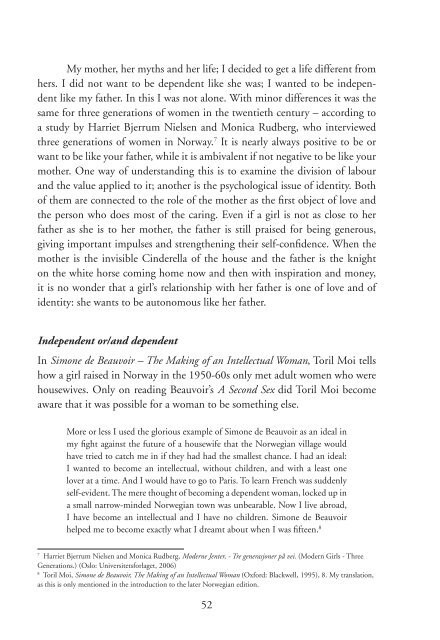Teaching Subjectivity. Travelling Selves for Feminist ... - MailChimp
Teaching Subjectivity. Travelling Selves for Feminist ... - MailChimp
Teaching Subjectivity. Travelling Selves for Feminist ... - MailChimp
Create successful ePaper yourself
Turn your PDF publications into a flip-book with our unique Google optimized e-Paper software.
My mother, her myths and her life; I decided to get a life different from<br />
hers. I did not want to be dependent like she was; I wanted to be independent<br />
like my father. In this I was not alone. With minor differences it was the<br />
same <strong>for</strong> three generations of women in the twentieth century – according to<br />
a study by Harriet Bjerrum Nielsen and Monica Rudberg, who interviewed<br />
three generations of women in Norway. 7 It is nearly always positive to be or<br />
want to be like your father, while it is ambivalent if not negative to be like your<br />
mother. One way of understanding this is to examine the division of labour<br />
and the value applied to it; another is the psychological issue of identity. Both<br />
of them are connected to the role of the mother as the first object of love and<br />
the person who does most of the caring. Even if a girl is not as close to her<br />
father as she is to her mother, the father is still praised <strong>for</strong> being generous,<br />
giving important impulses and strengthening their self-confidence. When the<br />
mother is the invisible Cinderella of the house and the father is the knight<br />
on the white horse coming home now and then with inspiration and money,<br />
it is no wonder that a girl’s relationship with her father is one of love and of<br />
identity: she wants to be autonomous like her father.<br />
Independent or/and dependent<br />
In Simone de Beauvoir – The Making of an Intellectual Woman, Toril Moi tells<br />
how a girl raised in Norway in the 1950-60s only met adult women who were<br />
housewives. Only on reading Beauvoir’s A Second Sex did Toril Moi become<br />
aware that it was possible <strong>for</strong> a woman to be something else.<br />
More or less I used the glorious example of Simone de Beauvoir as an ideal in<br />
my fight against the future of a housewife that the Norwegian village would<br />
have tried to catch me in if they had had the smallest chance. I had an ideal:<br />
I wanted to become an intellectual, without children, and with a least one<br />
lover at a time. And I would have to go to Paris. To learn French was suddenly<br />
self-evident. The mere thought of becoming a dependent woman, locked up in<br />
a small narrow-minded Norwegian town was unbearable. Now I live abroad,<br />
I have become an intellectual and I have no children. Simone de Beauvoir<br />
helped me to become exactly what I dreamt about when I was fifteen. 8<br />
7<br />
Harriet Bjerrum Nielsen and Monica Rudberg, Moderne Jenter, - Tre generasjoner på vei. (Modern Girls - Three<br />
Generations.) (Oslo: Universitets<strong>for</strong>laget, 2006)<br />
8<br />
Toril Moi, Simone de Beauvoir, The Making of an Intellectual Woman (Ox<strong>for</strong>d: Blackwell, 1995), 8. My translation,<br />
as this is only mentioned in the introduction to the later Norwegian edition.<br />
52

















